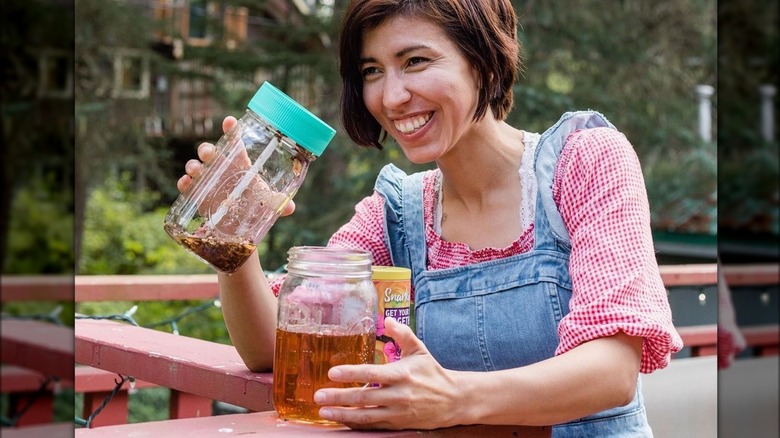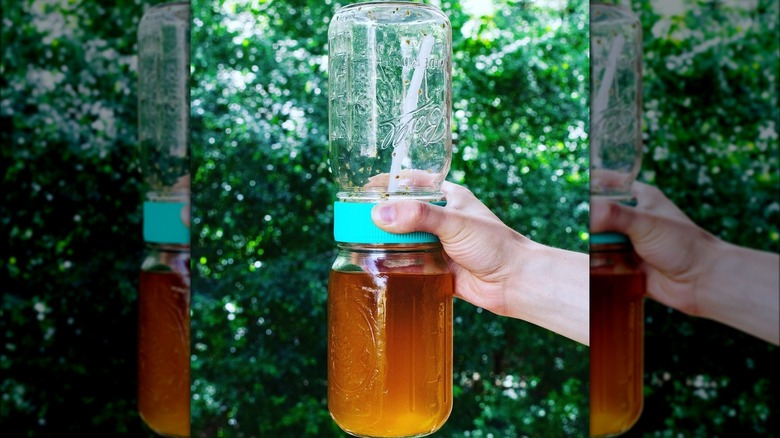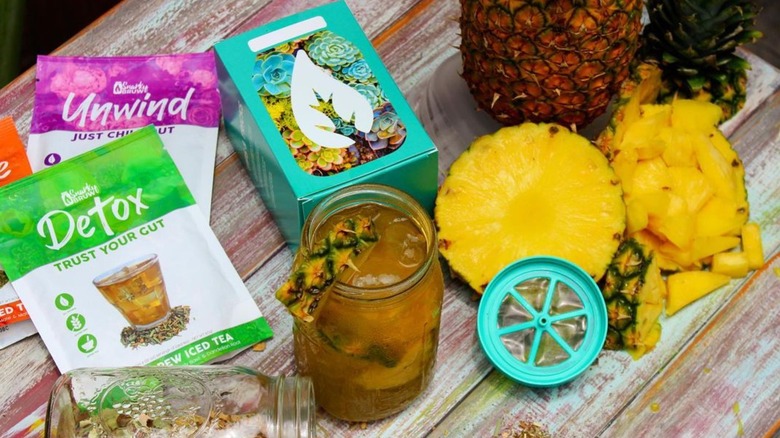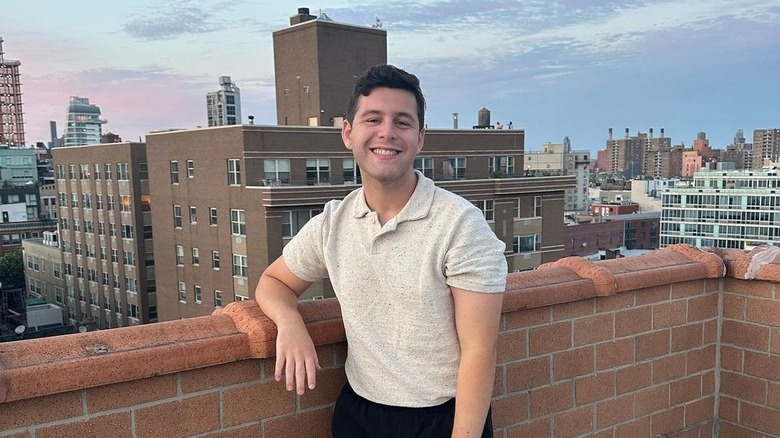Bruw: Here's What Happened After Shark Tank
Cold brews make for a refreshingly smooth and mellow coffee to guzzle on a warm day, but it's more fun if you leave the brewing to someone else — preferably a coffee shop or a can picked up from a store around the corner. Making cold brew at home is more complicated than it may seem, often requiring messy DIY gadgets like cheesecloths and strainers or dedicated equipment that can cost a pretty penny. But 15-year-old Max Feber had a more cost-effective and mess-free solution to quench his thirst for cold brews: He designed a filter with a straw that could be screwed onto two mason jars to strain the cold water-stepped coffee.
Armed with his design and crowdfunding from a Kickstarter campaign, Feber launched Bruw in 2015. Feber took Bruw to "Hatched" — a show that mentored young entrepreneurs — and soon his cold brew filters had won a deal with Home Shopping Network and a partnership with The Grommet. Bruw was proving to be a lucrative business idea, and Feber was wondering what the future had in store for his cold brew filters. As it turned out, Bruw's future had a Tank and a few Sharks swimming in it, for Feber appeared on season 10, episode nine of "Shark Tank" and impressed more than one potential investor in the room.
What happened to Bruw on Shark Tank
Feber walked into "Shark Tank" with the buoyancy and enthusiasm of an entrepreneur who the Sharks joked was likely charged with all the cold brews that he was making — but he impressed the room with more than his go-getter attitude. The young entrepreneur was hoping to seek a $50,000 investment in exchange for 25% equity in Bruw and had the numbers to back it up.
Bruw had made $50,000 in sales the previous year and was on track to double the amount the year of its appearance on the show. Bruw also had an attractive profit margin: The coffee filters cost $4 to make and sold for $20, leaving a $16 gross profit on the sale of each unit. Feber claimed that the costs could be brought down even further to $1.50 if the scale of production increased. To add to that, Feber had successfully secured a patent for his coffee filters — all things that the Sharks, as viewers know, love to hear.
Ultimately, Bruw had three offers on the table. Kevin O'Leary offered $50,000 but wanted a 50% stake in the company instead whereas Daymond John and Mark Cuban were willing to make the investment for 30% of equity. But it was in Cuban that Bruw found its new investor, who went on to say that the 18-year-old entrepreneur was the reason that he and his fellow Sharks did the show — to foster entrepreneurship and keep the American dream alive.
Bruw after Shark Tank
Although hopeful entrepreneurs walk out of the Tank with a verbal deal with the Sharks, that's hardly the end of it. Over the six months that followed after the episode was filmed, Bruw was vetted by Cuban's lawyers and accountants, the company's taxes and finances were thoroughly scrutinized, and contracts were ironed out. It was only then that the deal with Cuban formally closed, and Bruw had an influx of funding and an investor onboard.
But it's not just the investment that Feber was after. The entrepreneur told Forbes that "Shark Tank" wasn't so much about raising money for Bruw as it was about "gaining a strategic partner and gaining publicity ... and getting the badge of Shark Tank." It turns out, Feber got exactly what he hoped for. Calling it the "Shark Tank aftermath," Feber said that new orders poured in after the show aired, news channels came calling for interviews, and Bruw had made more sales in the 48 hours after the show aired than it had in the two years before (via Clark University). Feber claimed that Bruw was the only company in the Mark Cuban Capital portfolio to have made even more revenue the day after the episode aired as compared to the day that it did. Even better, the zealous entrepreneur reached out to potential patrons who had abandoned their baskets at checkout on Bruw's website, gave them a ring on FaceTime, and converted nearly 80% of them into customers.
Is Bruw still in business?
Feber came up with the idea for Bruw when he was only 15, and though it turned out to be a successful company, and one that was backed by Cuban no less, Feber faced another problem in the years after the show: He was burnt out. The entrepreneur told his alma mater Babson College that the business was making him feel exhausted every day, he wasn't excited by the prospect of all the fundraising and scaling that it would take to run Bruw successfully, and he simply didn't have the same energy for it anymore.
Though he wanted to have his own business at some point in the future, Bruw just didn't feel right at the time, so the entrepreneur decided to sell his company in 2020. But it wasn't just any investor he sold the company to; Bruw was acquired by another "Shark Tank" business, SnarkyTea, which had appeared in the previous season and struck a deal with Mr. Wonderful.
Feber originally reached out to SnarkyTea's CEO Jenni-Lyn Williams on a "Shark Tank" alumni group on Facebook for a simple partnership. The entrepreneur wanted to launch a new line of cold brew tea filters and could think of no company better suited to promote it. The partnership turned into an acquisition, and Bruw's cold brew filters were turned into cold brew tea filters, which are now sold on SnarkyTea's website either on their own or with two 32-ounce mason jars at an additional cost.
What's next for Bruw's founder?
Although selling Bruw to SnarkyTea was a bittersweet moment for Feber, he told Babson College that the acquisition was also a relief: "As much as I loved the time I spent running it, being able to wake up without worrying about cashflows, staff, or delays in our supply chain was a pretty good feeling." The entrepreneur planned on enjoying his senior year of college with plans to apply for a job afterward or even start a fresh business. As it turns out, Feber did both.
The entrepreneur went on to work at several companies, including working as Founding Operations Director for Gay Water, a canned vodka soda-selling business. Feber also launched a start-up called Bellwether in 2021, which is reportedly a new social media platform currently in beta mode that focuses on political activism — though not much else is known about it. But judging by Lori Greiner's assessment on "Shark Tank" that Feber had more potential in him than his first business that was Bruw — and Feber's own passion for entrepreneurship — it's safe to assume that this isn't going to be the last business that Feber successfully launches, and it's likely just the beginning of his entrepreneurial journey.





